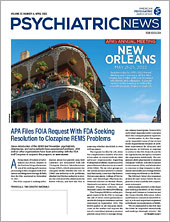Psychiatrists understand the frustration patients feel when they start an antidepressant, deal with the side effects, and do not experience any change in their symptoms for as many as six weeks, if they respond at all. But researchers may be one step closer to developing a simple blood test that could indicate whether a patient will respond to a prescribed antidepressant as early as one week after starting the medication.
Mark Rasenick, Ph.D., Steven Targum, M.D., and colleagues have identified a biomarker that predicts whether patients with major depressive disorder (MDD) will respond to antidepressants. They published their findings in Molecular Psychiatry earlier this year. Rasenick is a distinguished professor of physiology and psychiatry at the University of Illinois College of Medicine; a VA Research Career Scientist; and co-founder, president, and chief scientific officer at Pax Neuroscience, a life sciences company focused on developing biomarker tests for the fields of psychiatry and neuroscience. Targum is scientific director with Signant Health and chief medical officer at Pax Neuroscience.
Rasenick and Targum’s work builds on decades of previous research around the protein Gs alpha, which neurotransmitters use to make the molecule adenylyl cyclase. Previous research has shown that adenylyl cyclase is low in patients with MDD because Gs alpha is predominantly stuck in membranes called lipid rafts. Antidepressants appear to move Gs alpha out of those rafts, the authors wrote, and boost the patient’s adenylyl cyclase.
The researchers analyzed data from a study at the Emory University School of Medicine involving 49 participants with MDD and no psychosis and 59 controls with no history of MDD; participants ranged in age from 30 to 64 years. They were screened using the 17-item Hamilton Rating Scale for Depression (HAM-D) and completed at least two visits with researchers, scheduled one week apart, at which blood draws occurred to assess Gs alpha.
Analyses of the blood draws revealed that during the initial screening visit, participants with MDD who were not taking antidepressants had significantly lower Gs alpha-activated adenylyl cyclase activity compared with healthy controls, confirming decades of research that suggested depressed patients have some impairment in their ability to boost adenylyl cyclase, Targum explained.
Then, the researchers examined if the Gs alpha biomarker could also predict whether patients responded to antidepressants. The patients with MDD were invited to participate in an open-label antidepressant study for six weeks, and 19 chose to do so. (The patients were prescribed citalopram, duloxetine, escitalopram, fluoxetine, nortriptyline, or venlafaxine XR after consultation with a study psychiatrist.) They had their blood drawn a third time after the six weeks had passed. Overall, 11 of the participants responded to their antidepressants (response was defined as ≥50% improvement on HAM-D score) after six weeks.
The patients who responded to their antidepressant treatment experienced significant increases in Gs alpha-activated adenylyl cyclase compared with those who did not respond to the medications, Targum and Rasenick found. Eight of the patients who responded to their medications had a 30% increase in adenylyl cyclase stimulation, which Targum said is a significant increase. “Achieving significance in such a small sample is remarkable,” he said.
The findings suggest that a blood test may be capable of indicating that a patient is responding to treatment by showing whether Gs alpha is out of the lipid rafts. More research is necessary, Targum and Rasenick said, but they are optimistic. “There are so many years of preclinical work that are entirely consistent with this finding that we’re really enthusiastic that we have something very meaningful, but cautious in saying that we absolutely do,” Rasenick said.
Targum added, “The idea of identifying a biomarker that would facilitate treatment has been an elusive target of Mark and mine’s collective careers.”
Because blood platelets only live one week, Rasenick explained, the biomarker might show whether the patient will respond to antidepressants as soon as one to two weeks after beginning the medication.
“As a previously practicing psychiatrist, I know how frustrating it can be for patients to wait and find out if they will respond to these antidepressants,” Targum said. “Their question is, What’s the justification for me to continue taking this medication, other than my psychiatrist telling me it takes four to six weeks? This would allay some of that anxiety and give them some assurance that continuing their medications for a longer period of time is warranted.”
Past APA President and psychopharmacology expert Alan Schatzberg, M.D., said Rasenick and Targum’s study is important. “This could be a very, very useful biomarker that could be used as a companion to treatment,” he said. Psychiatrists may potentially be able to use the biomarker to answer questions around dosage schedules for patients, as well. “There are a couple of ways it could be used,” he said, noting that more research, especially around the biomarker’s potential use as a diagnostic test, is necessary. Schatzberg is the Kenneth T. Norris Jr. Professor of Psychiatry and Behavioral Sciences at Stanford University.
Next, Targum and Rasenick hope to conduct a double-blind, placebo-controlled study so they can confirm their findings and test their hypothesis that the biomarker could be evident as soon as one week after treatment starts.
“We consider this a social justice project,” Rasenick said. “Many people with depression don’t seek treatment because they think it’s all in their heads. If we can convince them that, actually, depression is a disease that can register in the blood, we can hopefully do good things for a lot of people, prevent suicide, and transform the care of people with depression.”
The study was funded by National Institutes of Health grants to Pax Neuroscience and a U.S. Department of Veterans Affairs Merit Award. ■
“A Novel Peripheral Biomarker for Depression and Antidepressant Response” is posted
here.

